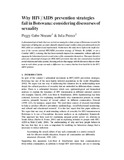| dc.contributor.author | Ntseane, P.G. | |
| dc.contributor.author | Preece, J. | |
| dc.date.accessioned | 2010-06-16T13:36:13Z | |
| dc.date.available | 2010-06-16T13:36:13Z | |
| dc.date.issued | 2005-09 | |
| dc.identifier.citation | Ntseane, P.G. & Preece, J. (2005) Why HIV/AIDS prevention strategies fail in Botswana: considering discourses of sexuality, Development Southern Africa, Vol. 22, No. 3, pp. 347-363 | en_US |
| dc.identifier.issn | 0376-835X | |
| dc.identifier.issn | 1470-3637 | |
| dc.identifier.uri | http://hdl.handle.net/10311/517 | |
| dc.description.abstract | A phenomenological study that was carried out among five ethnic groups of Botswana revealed the
importance of taking into account culturally situated sexual realities when prevention policies for
HIV/AIDS are considered and implemented. Furthermore the study threw light on the ineffectiveness
of the current national HIV/AIDS prevention strategy of ‘Abstain, Be faithful, or use a
Condom’ (ABC), a strategy that has been externally imposed on communities, without sufficiently
engaging the behavioural practices and values of the communities themselves. This paper therefore
advocates educational strategies for HIV/AIDS prevention that take into consideration localised
social relations and value systems. Devising policies that engage with the discourses that are dominant
in each ethnic group can make a difference in a country that has been hard-hit by the HIV/
AIDS epidemic | en_US |
| dc.language.iso | en | en_US |
| dc.publisher | Routledge. http://www.tandf.co.uk/journals/titles/0376835x.asp | en_US |
| dc.subject | HIV/AIDS | en_US |
| dc.subject | Educational Strategies | en_US |
| dc.subject | Sex | en_US |
| dc.subject | Botswana | en_US |
| dc.title | Why HIV/AIDS prevention strategies fail in Botswana: considering discourses of sexuality | en_US |
| dc.type | Published Article | en_US |

